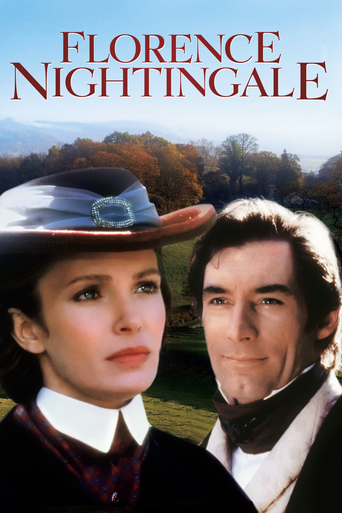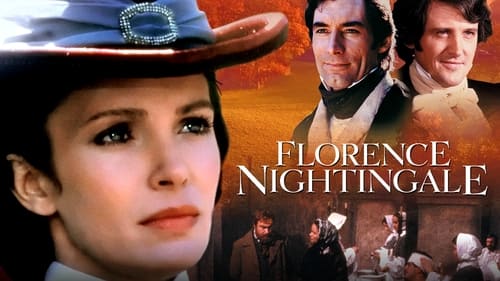mark.waltz
She dared to disrupt a man's world, stepping in to change the ways hospitals were run, and testing her own inner strength which she claims came from a divine calling. Changing from her life as a great lady in a wealthy family of British nobles to the legendary lady with the lamp who cleaned up military hospitals and changed the way that patients are cared for. I've seen the underrated 1936 film, "The White Angel", which starred Kay Francis, but yet have to find the 1951 British film, "The Lady with the Lamp" starring Anna Neagle. This lavish version stars Jaclyn Smith who will win your heart as the beautiful lady who realized that true beauty comes from within and is not fulfilled until one becomes completely unselfish.This really covers the ground of the struggles she went through in finding her way in the profession of nursing, showing the squalor of what it was before. The old hags who interview her for the position of hospital administrator are obviously jealous, and many of the doctors she encounters maliciously sexist. But the minute she's with the ailing soldiers, you can feel the peace she brings them. Then, there's her discovery of something rotting under the hospital which has made it into the water supply, and it really is just beyond disgusting. While at first glance, Smith isn't the perfectly ideal Florence, but she delivers the goods. Timothy Dalton plays her longtime suitor who loses her to her calling, and Claire Bloom and Jeremy Brett are her shocked parents, horrified by her desire to change her station, yet eventually proud. Carol Gillies is the vindictive nurse whose venom of jealousy spills out with hatred. Think of her as a combination of Gladys Cooper's envious nun in "The Song of Bernadette" and "Downton Abbey's" O'Brien. The narration throws the film off a bit, but the lavishness, detail and most of all, its big heart will completely win you over.
barbara-76
Like many older Englishwomen, I grew up with the story of Florence. And the one thing this movie does is strike me as distinctly unrealistic.There is, of course, some truth in the story itself, although even that is prettified. However the production values are simply ridiculous. Everything is too neat, too clean, too pretty. To include white lace on Florence's costume - and, for that matter, mascara on her face and clean white sheets on her bed - is simply nonsensical. Even the very wealthy with countless servants in those days were lucky to have such luxury. Florence was a desperately hard working and very practical woman in the middle of a war zone with no luxuries whatsoever; her primary battle was to obtain beds for her patients, preferably ones away from cess pits, rather than keep her lace spotless.
James Hitchcock
Florence Nightingale has long been a revered figure in Britain, so much so that she has even been officially canonised by the Church of England, so it is not surprising that a number of films have been made about her life, the most famous of which is probably "The Lady with the Lamp" with Anna Neagle from 1951. (I must admit that I have never seen any of them). Nightingale had many achievements to her credit; she was the founder of modern nursing, a celebrated social reformer and also a gifted mathematician and statistician, being regarded as a pioneer of statistics as an intellectual discipline. Her prominence in the public's imagination, however, largely rests upon her role as a nurse during the Crimean War. Most of the films I refer to earlier were made in the early twentieth century; the first dates from as long ago as 1912, only two years after her death. This television drama from 1985 is the only film about her in recent decades and, as one might expect, deals with her early years, up to and including her Crimean War experiences. When I recently reviewed "Grace Kelly", another eighties made-for- television biopic starring a former Charlie's Angel, in that case Cheryl Ladd, it struck me as an object lesson in how not to make a filmed biography, being quite devoid of any insight into what sort of person Kelly was or of any dramatic tension. Its only aim seemed to be to convey factual information; I could just as well have been watching a dramatisation of an encyclopedia entry. The lack of any physical resemblance between Ladd and the woman she was playing didn't really help matters. Certainly, Jaclyn Smith probably looks even less like Florence Nightingale than Ladd does like Grace Kelly, but that does not matter quite so much. Kelly was one of the iconic beauties of her generation, whereas Nightingale, although described by contemporaries as attractive in her youth, became famous for matters quite unconnected with her looks, and this film avoids most of those defects which so marred "Grace Kelly". A biopic needs to do more than simply narrate the facts; it also needs a narrative structure akin to that of a purely fictitious drama, and this can often be supplied by dramatising some conflict or struggle in the life of its subject. The story as told here is that of a strong woman who has to struggle against obstacles, both external social ones and internal psychological ones, in order to achieve her destiny. Nightingale's internal conflict is the one between her love for the poet and statesman Richard Monckton Milnes and her religiously-inspired sense of vocation as a nurse. In reality, Nightingale rejected Milnes after a nine year courtship, convinced that marriage would interfere with her ability to follow her calling, whereas in the film it is he who rejects her, a change probably made in order to soften her character. Nightingale's external conflicts are twofold. She initially experiences resistance from her family to the idea of her becoming a nurse- in the early nineteenth century nursing was not regarded as a fit profession for a young lady of quality- but this is soon overcome after she wins over her kindly, liberal father William. She faces more serious opposition to her plans to form a female nursing corps to nurse soldiers in the Crimean War. The British military establishment, including the Army Medical Corps, was particularly resistant to change- wounded soldiers had never previously been attended by female nurses- and tended to regard sick and wounded "other ranks" as expendable, even if their wounds had been incurred while performing some heroic action. Even here, however, Nightingale eventually succeeds in her goals, aided by allies such as the politician Sidney Herbert and the journalist William Russell, and by the fact that even the Army top brass cannot close its eyes to the dramatic reduction in the death rate achieved by her methods. Jaclyn Smith was easily the most beautiful of the various "Angels", with Tanya Roberts her only serious rival in that department. (I realise that will be a controversial statement, but then I am one of the few heterosexual males of my generation not to have had a schoolboy crush on the artificial-looking Farrah Fawcett-Majors). Jaclyn also struck me as having a lot more talent than some of the other Angels, so I am always surprised that she never went on to become a major movie star, although she has remained a well-known figure on television. She acquits herself well here, showing that there was a lot more to her than just a bikini- clad beauty and that she was also capable of taking on leading roles in serious drama. The best of the supporting cast are probably Jeremy Brett as William and future James Bond star Timothy Dalton as Milnes. "Florence Nightingale" is informative, but also dramatically satisfying, the sort of biopic that works both as biography and as drama. It can serve as an object lesson in how to make a successful filmed biography. 7/10
Mark Krasselt
The life of Florence Nightingale--one of the great intellectual titans this world has ever known--is fascinating and dramatic, and one fraught with sacrifice, courage, and great sadness.As someone who spent two years with the subject through research and by writing and completing a full-length spec script on Nightingale (written and registered before NBC's TV movie was available on DVD), I viewed this film more as series of missed opportunities and plodding digressions, distinguished more by what the left out or glossed over or ill- advisedly reinvented than by what they left in. Overall, the teleplay was fine for what is was up until the point Florence arrives in the Crimea. Once in Turkey, however, the biopic simply falls flat on it face, finding little drama and even less resolution. While I completely understand that not every nuance of history can be examined and budgetary constraints determined structure and style, the teleplay failed to capture even the essence of any real tension vs. resolution. Everything just neatly fell into place while real life and real history is far messier.For instance, watching the movie, one is left with the feeling that while FN's mother may have had some disagreement with her choice in career, she was generally okay with it. In fact, their arguments were frequent and very loud--a veritable boxing match that was constant and damaging. Florence rather despised her mother and the matronly traditions she stood for.Florence herself did not make a connection between the sickness of her men and the "sickness" of Barracks Hospital. In fact, Florence, or the British Army, did not understand (or believe) that airborne or water-borne diseases existed, hence no alarm was made by the decaying carcasses contaminating the water supply.While the teleplay did mention that God was her inspiration and that he "spoke" to her, the film leads you to believe He did this on this one time. In fact, her writings reveal a deep and unbridled relationship with God and many incidents of "conversation", the most dramatic one being on her 30th birthday after a particularly mystical trip to Egypt and Greece. Florence's struggle with the meaning and message of her belief in the Divine mandate is one of the key--some would say flaw, others would say divinely sacrificial--aspects of her character that is the hardest to digest and/or dramatize.In the 20 years since the teleplay, there have been several major works published on her life and times, and these have aided immeasurably in our understanding of the complex nature of Florence Nightingale. And I don't want to mistakenly fault the teleplay for not having the benefit of future research. History changes as events reveal themselves over the blanket of time.Yet, the drama failed to exploit the information it had on hand at the moment to any large degree, taking a middle of the road stance based more on mythology than real life. It did further injustice by embellishing the myth even more with Hollywood half-truths. And it could be that the complexity of her life is too difficult for any one film to examine. Many are mystified by her, as she both mesmerized and infuriated people all at the same time--perhaps herself most of all. She is both scion and Saint, linguist and mathematician, prolific researcher and writer, a mystic, a healer, and beacon of hope to generations, a national heroine.When you are all that, where is there room for the "real" you?




